Replete with exquisite carvings from various stories of Hindu mythology, Ellora Caves – Kailasa Temple is perhaps the most beautiful monument in the world. It is dynamic as the cosmic dance yet calm as a sage or Rishi. Part of one of the first UNESCO World Heritage Sites in India since the year 1974, there are many stories surrounding this ballad in stone.
Contents
Was Kailasha Temple built by aliens?
This was the question that set the ball rolling for us decades ago. We watched a documentary on the History channel that covered the ancient Kailashnath a.k.a Kailasha Temple in detail. Our eyes popped out at the splendour. Apparently, there was a theory that Kailasha Temple was humanly impossible in the 8th century. The unparallel beauty, moreover the refined architectural techniques behooved the question that whether aliens from space had come down to create this architectural feat. The alien theory thankfully did not gain evidence. However, it was enough to put this on our “must-visit places in a lifetime” list.
How to reach Kailasa Temple
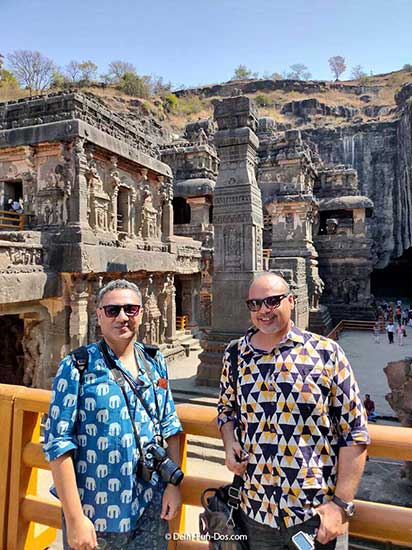
Kailasa Temple is a part of the UNESCO World Heritage Site – Ellora Caves, one of the top things to do in Maharashtra, India. Kailash Mandir is somewhat the central shrine among the Ellora Caves and acts as a divider between the Buddhist caves on the right and the Jain caves on the left.
From afar, reaching Ellora and neighbouring Ajanta Caves seemed a riddle. But after our visit, we can say that these sites can be easily approached from various parts of India. Aurangabad is the closest city to Ellora Caves. It has a busy railway station and an active airport. Our Delhi – Aurangabad flight took about 2 hours and we put up at Aurangabad city. The Maharashtra Tourism Department Corporation (MTDC) guest house was about 15 minutes from the airport. Staying at Aurangabad was a jolly good idea since that city itself had so much to offer. Ellora Caves were less than 30 km from Aurangabad. We wanted to avoid traffic so started early and it took us about 45 minutes in a taxi to reach Ellora Caves.
PIN IT FOR LATER READ
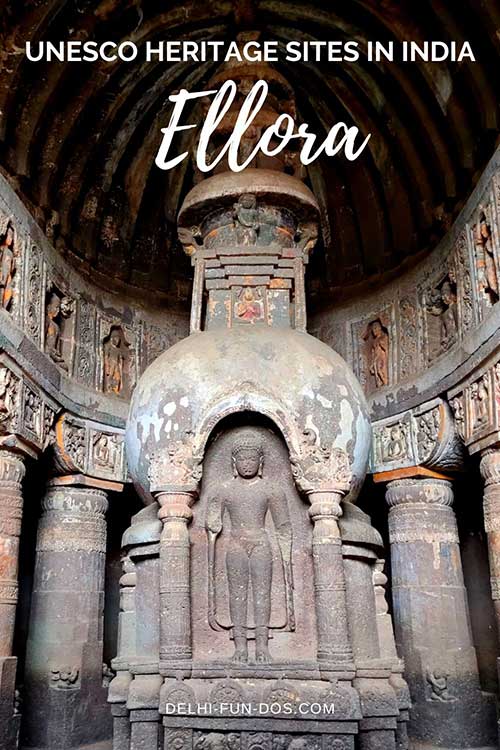
Ellora Caves, one of the best places to see in India, are also well connected with Mumbai and Pune.
Ellora Caves – Kailasa Temple
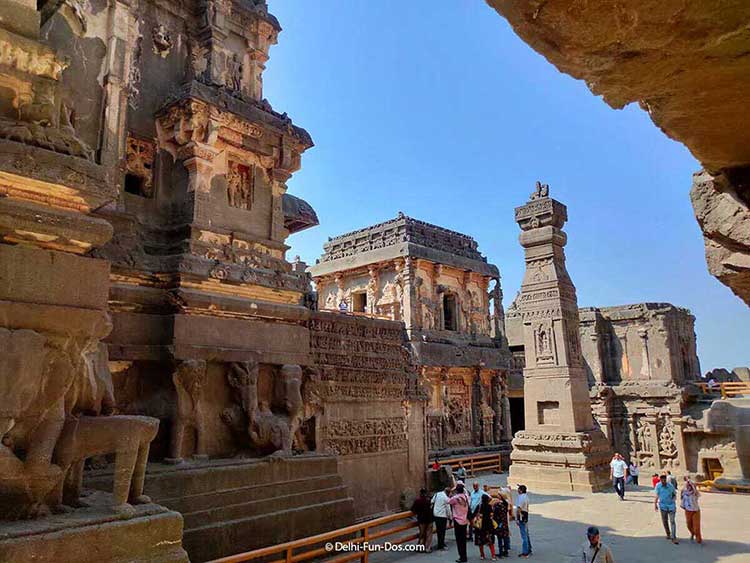
When we entered the Ellora Caves complex, the first thing that turned our heads were these beautiful stone carvings. The stone sculptures were part of the gate to Cave 16, the Kailasa Temple. Kailasa Temple was bang opposite the entrance area. The earthy facade looked so out of the world. We walked closer to the gate of the Temple and saw two sentinel statues guarding the entrance to the shrine. The entryway was exquisite, yet simple. When we walked through and entered the temple complex, our jaws dropped. We had read, heard, and seen various sagas about the greatness of the Kailasa Temple. Yet, the first look was totally overwhelming. It was difficult to believe that we were really there. The grandeur all around us was almost blinding. Thankfully we had a guide who almost woke us from our stupor and started showing the salient features.
The Kailasha Temple resembles the Himalayan peak Mount Kailash, the mythical home to Lord Shiva, the presiding deity. In fact, Kailashnath meant The Lord of Mountain Kailash and referred to Lord Shiva. The multi-storied temple was as detailed as larger than life. Just when we entered, a screen with a gorgeous carving of Gajalakshmi welcomed us. We walked into a courtyard that had the double-storied chariot-design temple at the centre. There were many smaller canopies in the courtyard, 2 flagstaffs or Dhajastambha, and a monolith that had been the statue of an elephant.
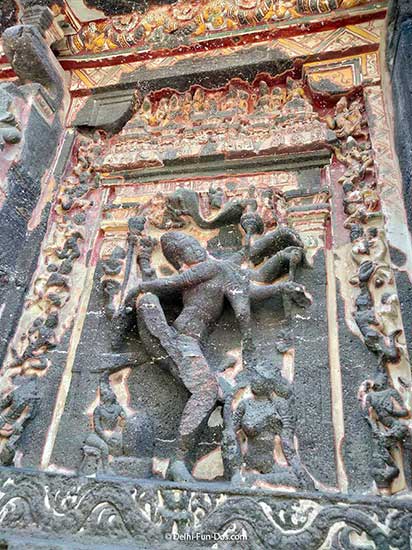
The corridors on the ground floor had huge carvings of Shiva in various moods. Among the ones we could identify were Bhairava the slayer, Shiva dancing the cosmic Tandav, and Shiva the groom during his marriage with Parvati, the daughter of the mountains. While the statues were ceiling-high, the eye for fine points was just stunning. The hairstyles, the intricate ornaments, the pleats in the garments, and the little details of postures that anyone could miss had been brought to life in stone. In the statue depicting the marriage, Parvati’s second toe crossed her big toe just like a shy bride. Apart from Shiva and his consorts and companions, we also saw many carvings of Lord Vishnu. Stories from Ramayan were carved on the outer wall of the shrine. The designs were not symmetric but so harmonious that it seemed like an orchestra in stone, playing different notes and tunes but rendering as a whole.
The first storey housed the sanctum sanctorum with a large Shiva Lingam. The sanctum sanctorum of a Hindu temple is called the “Garbhagriha” since it resembles the womb or “Garbha“. Typical to ancient Hindu temples, the sanctum sanctorum of this humongous temple was small. Strategically, the sanctum sanctorum was always small since the deity would be adorned with gold and gems and this part of the temple was the place of wealth. Hence, it was necessary to secure the sanctorum and it was easy to guard a small chamber with a single opening.
The door jambs on this storey had beautiful paintings. Even after more than thirteen hundred years, their muted glory was such that we could not turn our eyes away. These paintings are only visible with a strong electric torch that was available with the guide.
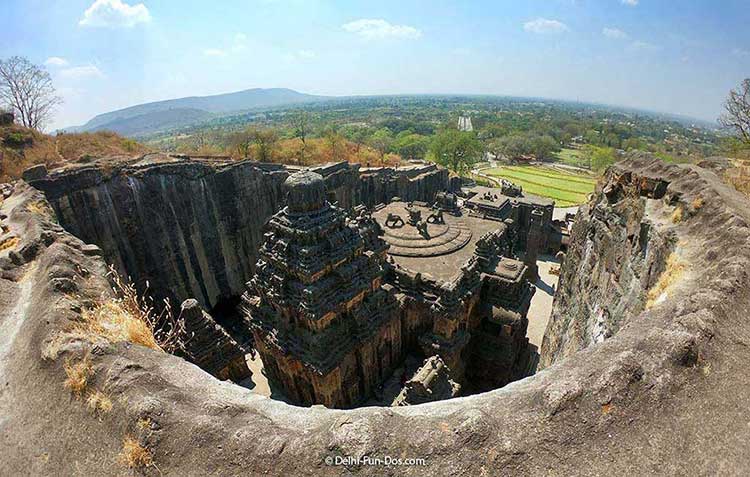
Top View of Kailasa Temple Ellora Caves, Aurangabad
While one commonly saw the Kailasha Temple from the base, we trekked up on a path outside the temple to see the temple from the top. When we reached up, we could see the pit in the hill where the temple was created. From here, we got a birds-eye view of the temple complex as well as the gorgeous carvings on the roofs from this height. The Dravidian style of architecture of Kailasa Temple was somewhat diluted from the base but was clearly visible when we saw it from here. Even after spending a couple of hours in the temple and having multiple orgasms all along, the floral spires or Gopurams on the rooftop, the Kirtimukh, and statues of Shardul or mythical lion were again a big surprise. The roof was like a three-dimensional painting in stone.
Not to be missed at Kailasa Temple
The whole Kailasa Temple complex, as well as every corner separately, is capable of blowing the visitors’ mind. It is like a beautiful movie that unfolds scene by scene. There is so much we want to describe but in hindsight, that might be a major spoiler. From experience, we suggest it is best you discover the temple yourself, in your own way. Yet, these are the following pieces that you should especially look out for when you are at the temple.
Ravana statue
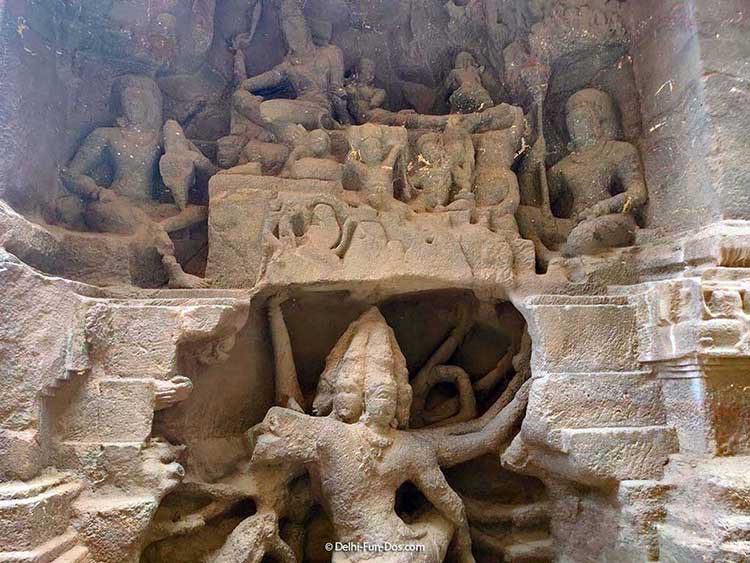
This is like a huge plaque depicting the demon king Ravana trying to lift Mountain Kailasha for replacing it in his kingdom, Lanka. The expressions of the various characters in this piece are noteworthy. Shiva is serene yet amused pushing the mountain back with his big toe, Parvati is disturbed and is holding Shiva, her companions are very afraid and are trying to escape, Shiva’s disciples, on the other hand, are unperturbed, confident in the powers of their lord, Shiva.
Dhajastambha
Two monolith obelisks are placed on the courtyard and these were perhaps flagstaffs or Dhajastambhas. The intricate carvings on the upper portions are noteworthy.
The elephants and the lions
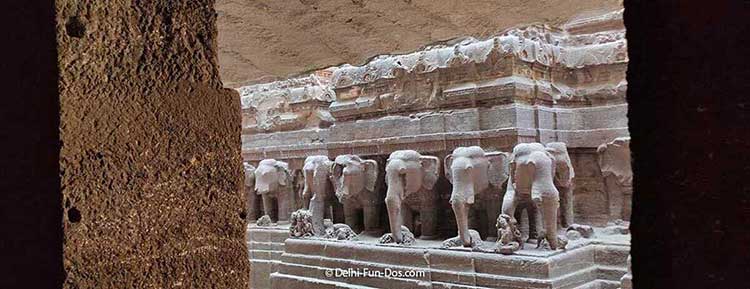
There are continuous rows of elephants and lions on the lower façade of the main temple as if they are holding the shrine up. Elephants denote prosperity while lions denote power. The posture of each animal is different.
Statues of Ganga, Yamuna and Saraswati rivers
There is a separate shrine in the complex dedicated to the divine forms of the rivers Ganga, Yamuna, and Saraswati. River Ganga is another consort of Lord Shiva. The beautifully carved human form of the rivers is noteworthy.
Ardhanariswara
The Ardhanariswara statue of Lord Shiva on the first floor is a harmony of male and female features in a single body.
Mahishasuramardini
On the first floor of the main temple, the Mahishashurmardini form of Goddess Durga drew our attention. This could also be because we are a huge fans of the Durga Puja festival in Kolkata and Delhi when the Goddess is worshipped in this avatar.
The Bridge at the Ellora Caves
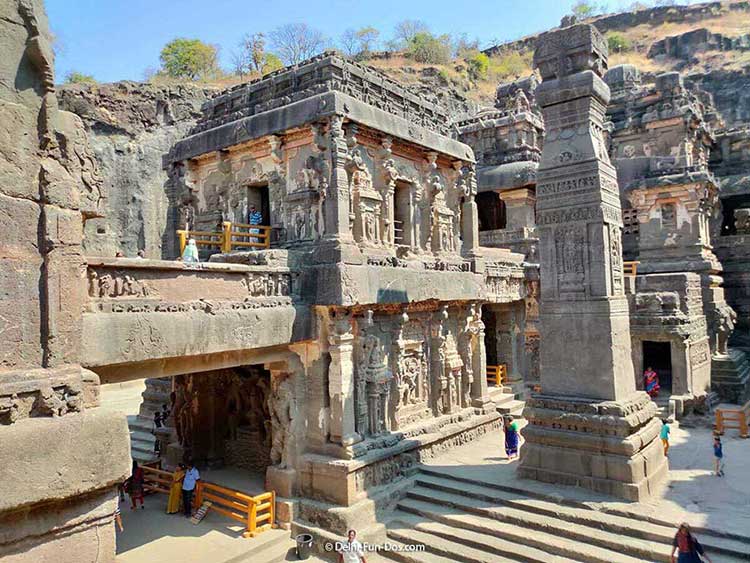
A bridge on the first floor connects the main shrine or the Gopuram to the subsidiary shrine for the bull Nandi, the vehicle of Lord Shiva. This bridge is perfect for getting clicked as it aptly captures the glory of the Kailash Temple. Additionally, we have mentioned earlier the Gajalakshmi and the Ramanaya panels that also blew our minds.
Who built the Kailasa Temple?
This is a complex question and after some research, we have found multiple historians throwing different names. It appears to us that the Kailasha Temple was built in the 8th century by the Rashtrakuta dynasty. It was started by the ruler Dantidurga and completed by his successor Krishnadeva. The Kailasha Temple was perhaps a valedictory act by these kings symbolizing the great prosperity of the Rashtrakuta kingdom. Given the enormity of this shrine, we felt maybe some later rulers expanded the temple in subsequent centuries.
What is the architectural specialty of Kailasa Temple?
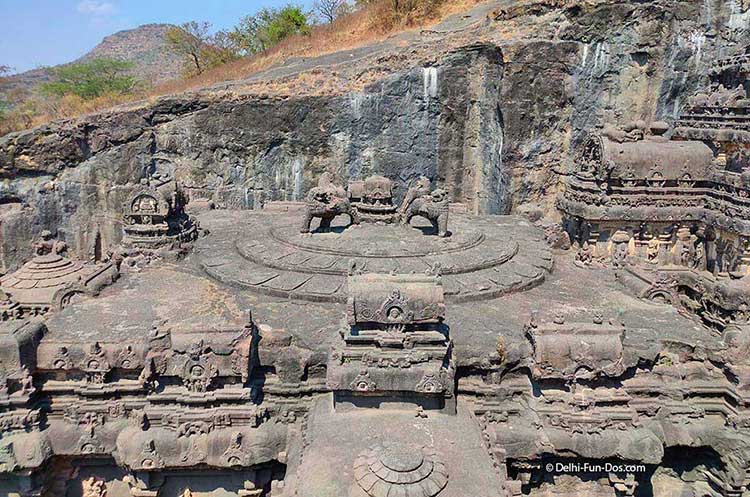
Kailasha Temple is the largest monolith temple in the world. It was carved out of a basalt cliff on the Charanandri Hills. A sophisticated and refined architectural practice was followed while creating the temple. The megalith was cut out top-down from the rock. In other words, the spires and the roofs appeared first, and then the body of the temple, and finally the base. All this was done with the aid of just a hammer and chisel. How this feat was achieved in the days of yore still baffles researchers. Modern architects are of the view that even in today’s era, achieving a marvelous piece like this monument, using top-down technology, would be nigh impossible. No surprise, the theory aliens built Kailasha Temple, floated around.
It was not aliens but thousands of skilled artisans painstakingly carved out this beauty. Researchers claim to have spotted evidence that experts from many regions and architectural styles were probably involved in this project. Some of the theories could be conjecture. Truth is, Indian civilization had achieved very high skills in arts and engineering in that era.
Also Read: Visiting Ajanta Caves – UNESCO World Heritage Site in India
Which day is Ellora Caves closed?
The whole point of our trip was to visit Ajanta and Ellora Caves. We did some solid research and double-checked before our journey so that we did not reach on a day when Ellora Caves including Kailasa Temple was shut. Do note – Ellora Caves are closed on Tuesdays. These are open on other days of the week.
In passing, Ajanta Caves are closed on Monday.
PIN IT FOR LATER READ
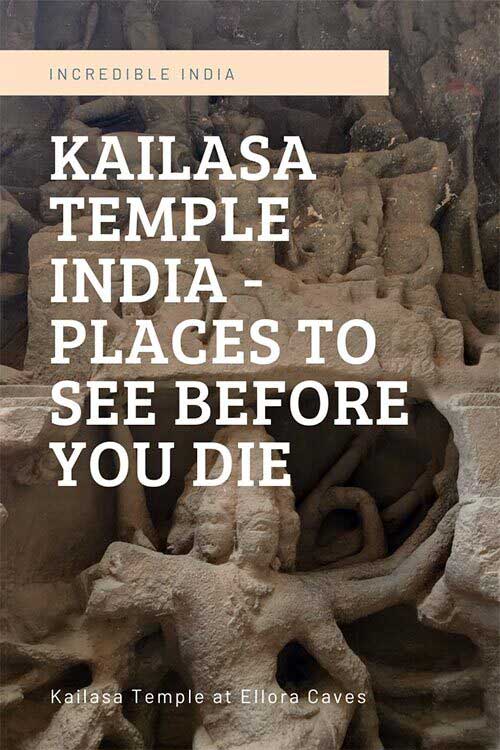
Best time to visit Ellora caves, Kailash Temple
Kailasha Temple is the mascot of Ellora Caves. It displays the pinnacle of cave temples anywhere in the world. Some tourists, perhaps on a tight timeline, visit only Kailash Temple in Ellora and do not venture to the other caves. That should take about 1½ to 2 hours and can be done any part of the year. But we wanted to spend maximum time and look at everything in detail. This was completely an outdoor activity and so we chose to travel in February. The cool weather was just right for our expedition which lasted for almost 8 hours.
Summers are harsh in the Deccan Plateau of India and heatwaves can be major deterrents for any outdoor activity. Ergo, winters are a great time to visit Kailasha Temple. Incidentally, we are told, Kailasha Temple looks beautiful after monsoon showers too. We shall plan our next visit to Ellora Caves during the monsoon months. After all, a single visit is not enough to grasp the beauty of the world’s largest monolith temple.
Pro-tips
- Guides are expensive here. Our guide charged us Rs. 1400 for a tour of select Ellora Caves. One of the caves he showed us was Cave 16 – Kailasa Temple. While our guide was a tad impatient and we were not very satisfied with the chappie, without a guide we would have been plain lost. If you are a first-timer, you must invest in a guided tour. Take a government authorized guide and convey your expectation in detail before appointing him.
- Loose clothing, sturdy walking shoes and drinking water are standard requirements to remain comfortable throughout the tour. Sometimes it gets very sunny so caps and umbrellas could come handy too.
- While the view from the roof is magnificent, the climb up is steep. So if there is any infirmity, or fear of heights, we suggest you refrain. What you see from below is already so rich! Kailasha Temple at Ellora Caves, in our opinion, is the most beautiful piece of architecture in the world and if you are here, that is already an accomplishment.

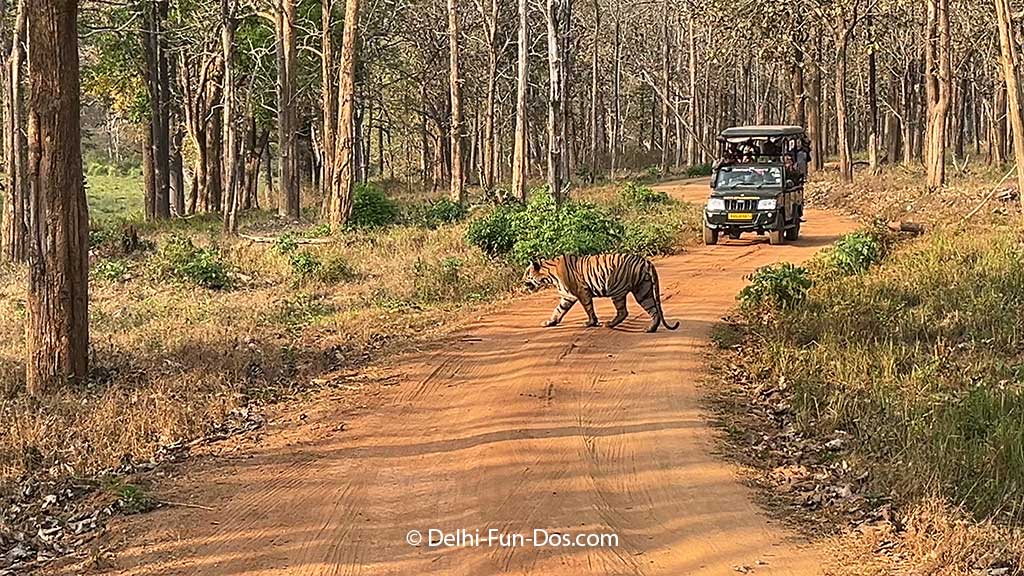
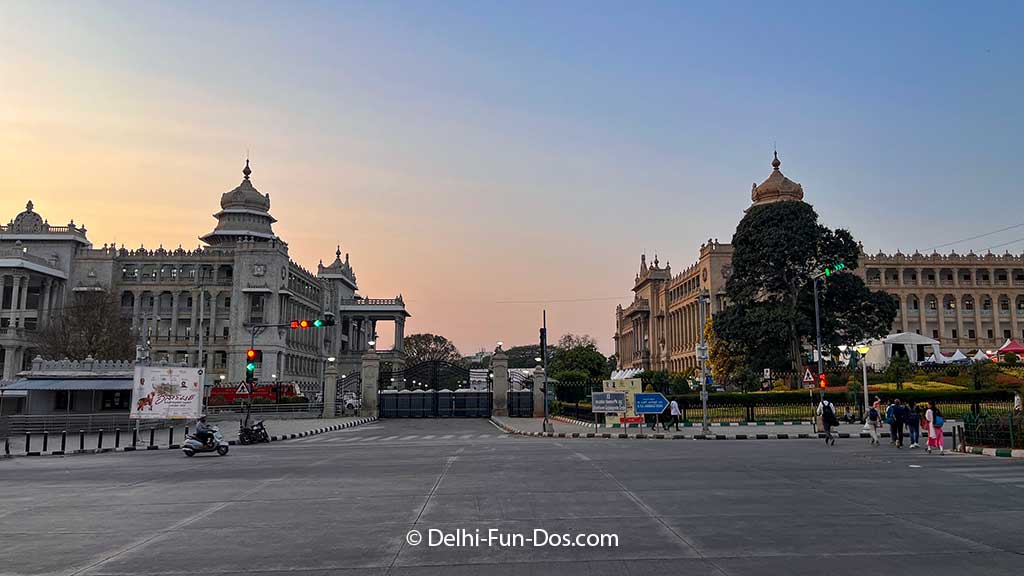
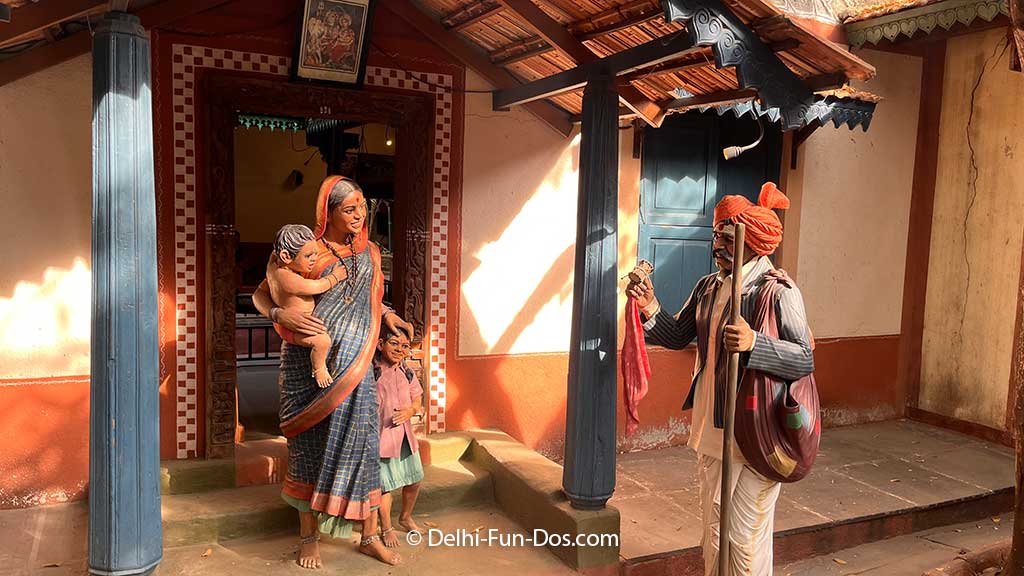
I would love to visit this place. It looks absolutely amazing and also on my bucket list. Let see when can I visit this one.
I was supposed to visit Kailasa Temple at Ellora last year but unfortunately that did not happen. Hopefully I will be able to plan once things get back to normal and we all start traveling again.
Everyone seems to be sharing all their travel tales, and amazing pictures which is making me wanderlust. My to travel list is growing longer by the day.
Planning Ajanta Ellora in the next winter, this post would definitely would come in handy!
Thanks for all the information on the Rashtrakuta dynasty. Also, I didn’t know about these alien rumors!
Delhi Fun Dos, Ellora Caves, Hampi, and Ramashewarm are on my radar. After reading your blog, I realized if I want to understand ancient India, then visiting it is a must. I liked the detailing where you mentioned the statue of Parvati Ma one toe over the other indicating shyness. Well crafted blog.
Kailasa Temple is truly a must-visit place. Built by aliens or not, the place is majestic and I would love to believe that it is the work of our ancestors! Thanks for sharing the tip about taking a guide. We always seem to have bad luck with guides. I guess we need to tell them our expectations beforehand!
Never visited this heritage gem of India but really loved the detailing in this post along with the tips.
I’ve heard so much about Ellora but had no idea of its rich history and detailed architecture! Your pictures are absolutely mesmerising – can’t wait to go here soon!
Yours is a prime example of informative writing. I think my students could learn a lot from your writing style and your content. I may share this article with them.